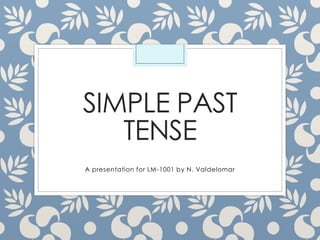
Simple Past Tense.pdf
- 1. SIMPLE PAST TENSE A presentation for LM-1001 by N. Valdelomar
- 2. FORM Affirmative Statements Negative Statements Subject Base Form of Verb + -d/-ed or Irregular Form Subject Did + Not Base Form of Verb I You He She It We You They arrived worked came yesterday. I You He She It We You They did not /didn’t arrive work come yesterday. Yes/No Questions Short Answers Did Subject Base Form of Verb Yes Subject Did No Subject Did + Not Did you arrive yesterday? Yes, I did. No, I didn’t. he work he he they come they they
- 3. Information Questions WH-Word DID Subject Base form of verb Who did you call? What did he do? When did they go? Where Why How WH-WORD (SUBJECT) ___ ___ Base Form of Verb + -d/-ed or Irregular Form Who ___ ___ called? What happened?
- 4. FORM Affirmative Statements Negative Statements Subject was / were Subject was/were + Not I He She It was home yesterday. I He She It was not /wasn’t home yesterday. We You They were We You They were not/ weren’t Yes/No Questions Short Answers Was/ Were Subject Yes Subject Was No Subject Was/ Were + Not Were you home yesterday? Yes, I was/ were. No, I wasn’t/ weren’t. Was he he he Were they they they Simple Past with the Verb TO BE
- 5. Information Questions WH-Word Was/ Were Subject Who was she? What were those? When were they home? Why Where were you? How WH-WORD (SUBJECT) Verb TO BE Who was with you? What that?
- 6. Important Notes 1. Do not use did in information questions when who or what is the subject. What did happen yesterday? (INCORRECT) What happened yesterday? (CORRECT) 2. Do not use did in negative statements or questions with was/were. I wasn’t there. Why was she late? We weren’t angry. Were you at the concert?
- 7. USES Actions or States Completed in the Past 1. Use the simple past for actions or states that started and ended in the past. Use time expressions to describe the time period. I lived in New York in 2000. They played soccer on Fridays. We went shopping last week. The weather was great yesterday. 2. The actions or states can happen in the recent past (a short time ago) or the distant past (a long time ago). Recent Past He called half an hour ago. She felt bad last night. Distant past They moved in 1980. He was in college ten years ago. 3. The actions or states can last for a long or a short period of time. Long Period of Time I lived in Mexico for 20 years. She was away for 10 months. Short Period of Time It rained hard for five minutes. He stayed in bed all afternoon. 4. The actions or states can happen once or repeatedly. Happened Once I met my best friend in elementary school. Happened Repeatedly We often did many things together.
- 8. PRONUNCIATION OF VERBS ENDING IN –ED The regular past tense ending -ed is pronounced in three different ways, depending on the final sound of the base form of the verb: 1. The -ed is pronounced /t/ if the verb ends with the sound /p/, /k/, /tʃ/, /f/, /s/, /ʃ/, or /ks/. work – worked wash – washed watch – watched 2. The -ed is pronounced /d/ if the verb ends with the sound /b/, /g/, /dʒ/, /v/, /ð/, /z/, /ʒ/, /m/, /n/, /ŋ/, /l/, or /r/. plan – planned judge – judged bang – banged bathe – bathed massage – massaged rub – rubbed 3. The -ed is also pronounced /d/ if the verb ends with a vowel sound. play – played sigh – sighed row – rowed bow – bowed sue – sued free – freed 4. The -ed is pronounced as an extra syllable, /ɪd/, if the verb ends with the sound /d/ or /t/. guide – guided remind – reminded invite – invited
- 9. Let’s Practice! did was were it the concert the test Maria you the children they your team rain yesterday first nervous fun win leave difficult start on time Build logical Yes/No questions. Use a word or phrase from each column. Punctuate your sentences correctly. Did it rain yesterday?